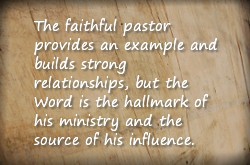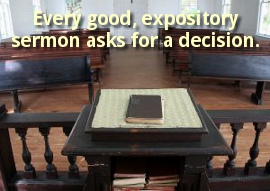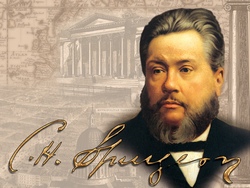“…it was not uncommon for the Puritan churchgoers to imbibe 8-12 hours of sermons per week” The Cripplegate
Toward Word-Centered Ministry
 Reposted, with permission, from My Two Cents.
Reposted, with permission, from My Two Cents.
Discussion
Evangelicalism's Got Talent
Body
I fear that a similar thing is occurring today among true evangelical believers. As with other seasons of church history when preaching was slowly stripped of its precision, clarity, and doctrinal depth, many contemporary congregations have slowly been robbed of the same.
The problem is: they don’t know it. The erosion has been too subtle.
Discussion
"Whoever believes…that’s it. It’s not whoever turns, tries, seeks, surrenders, stops, starts or anything else!"
Body
Terms That Abuse the Gospel
1. Let Jesus into your heart. 2. Invite Christ into your life. 3. Just say this prayer and you’ll be saved… 4. Make Jesus the Lord of your life (we don’t make him Lord. He IS Lord!) 5. Turn from all your sin (and, no, that’s not what “repent” means!)
Discussion
Preaching Worth Listening To
 An address to the American Association of Christian Colleges and Seminaries at their annual meeting, Feb. 2006. A PDF version is available at the PTC website.
An address to the American Association of Christian Colleges and Seminaries at their annual meeting, Feb. 2006. A PDF version is available at the PTC website.
Discussion
Book Review - Him We Proclaim: Preaching Christ from All the Scriptures
[amazon 9781596380547 thumbnail]
Discussion
"God gave me a Ferrari because I am a Ferrari. You're a Ferrari too. God has given you a Ferrari"
Body
“He was using it as part of a sermon illustration for his latest series titled ‘RPM: Relationships. Passion. Marriage.’”
Pastor Drives Ferrari into Church for Relationship Series
Discussion
C. H. Spurgeon - Sermon for New Year's Day
 Special thanks to The Spurgeon Archive. Spurgeon delivered this message on Thursday evening, January 1, 1885 at the Metropolitan Tabernacle, Newington.
Special thanks to The Spurgeon Archive. Spurgeon delivered this message on Thursday evening, January 1, 1885 at the Metropolitan Tabernacle, Newington.
“And he that sat upon the throne said, Behold, I make all things new.”—Revelation 21:5.
Discussion
"In his sermon, called a 'reflection,' Thompson read from the Torah and Quran, as well as the Bible"
Body
“ ‘You have to learn how to love people different than you.’ That’s the core belief for Thompson and a small band of Sacramento-area followers, who are quietly experimenting with a faith that takes ecumenical to the extreme.”… “The Sunday gathering is called an ‘ecumenical forum,’ not a worship service. There are no church members, but ‘friends.’” Sacramento Bee

Discussion